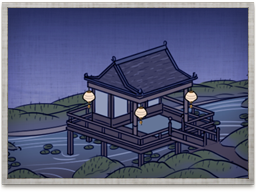Difference between revisions of "Sake Den (TWS2)"
| (One intermediate revision by the same user not shown) | |||
| Line 7: | Line 7: | ||
<li>+2 happiness across all provinces</li> | <li>+2 happiness across all provinces</li> | ||
<li>+100 to wealth from commerce in this province</li> | <li>+100 to wealth from commerce in this province</li> | ||
| − | <li>Enables recruitment of Rank 1 ninja</li> | + | <li>Enables recruitment of Rank 1 [[Ninja (TWS2)|ninja]]</li> |
| − | |Clan Effects=<li>Each Stealth chain enables you to sustain one additional ninja</li>}} | + | |Clan Effects=<li>Each Stealth chain enables you to sustain one additional ninja (Maximum: 5)</li>}} |
==Description== | ==Description== | ||
Latest revision as of 04:31, 19 January 2013
| Sake Den (TWS2) | |
|---|---|
 | |
| Chain | Stealth Type |
| Requires | - |
| Enables | Buildings: |
| Spawned Defence Forces | - |
| Basic Building Statistics | |
| Clan Effects | |
| See main article; FotS Buildings | |
Description
"Oi! Are you looking at my geisha, you bastard?"
A sake den makes people happy, after a fashion. There is much to be said in favour of a flask of sake at the end of a long, hard day, and many troubles look much smaller after a convivial evening. In the shadows, however, and hidden behind smiles, darker business can be transacted: secrets exchanged and arrangements made. Among other dangerous types, ninjas are to be found here.
One of the most popular beverages in Japan, sake was originally only produced in small quantities for personal consumption. In the 1300s, however, mass production began in larger distilleries, often near temples and shrines. In later years, the main producers kept to the same places thanks to the availability of good sake rice and good, clean water. Sake was often used in Shinto rituals, and today barrels of sake are still left at shrines as rather splendid offerings to the spirits. Sake is also central to the Shinto ceremony of “kagami biraki”, performed at weddings and festivals. Wooden casks of sake are smashed open with a mallet, and the drinks are then served to all the guests to bring them good fortune.